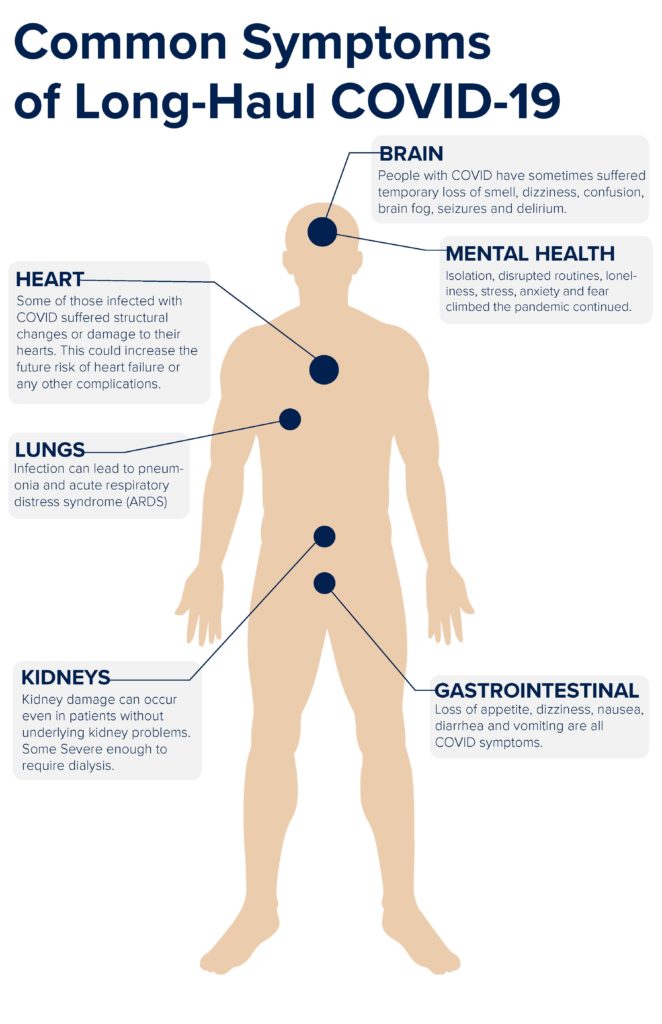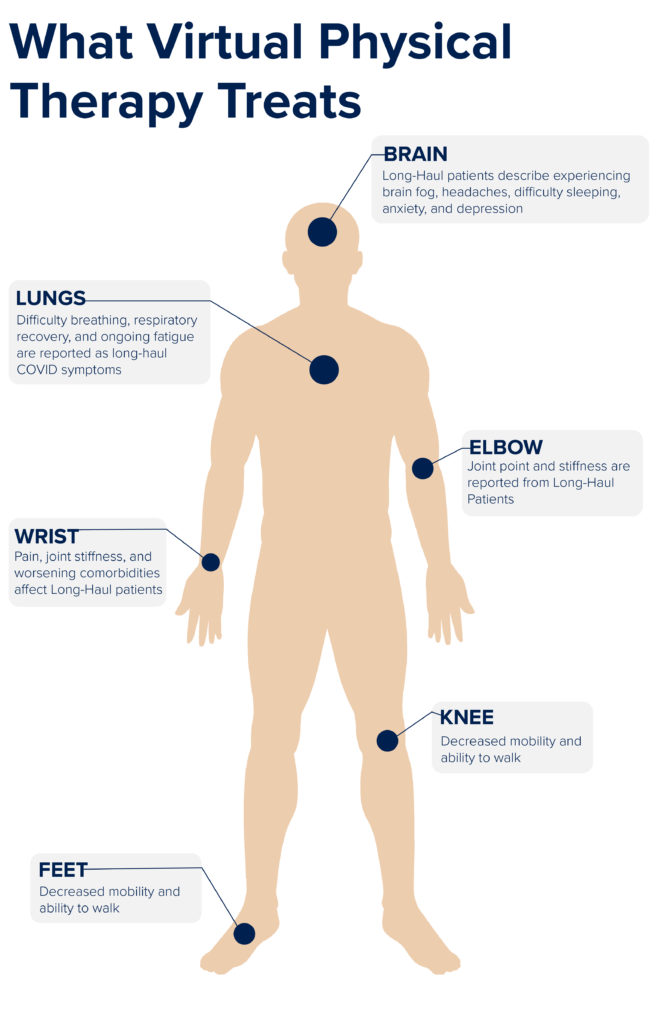A Physical and Mental Health Perspective
It’s been over a year since COVID-19 began spreading in the U.S. As the world continues to learn more about the virus’ impact on our physical health, we’re also keenly aware of how significant life during the pandemic is on our collective mental health. Some early estimations indicate that between one-third and one-half of COVID-19 patients experience some form of mental health issue. And, for those who are experiencing long-term symptoms, the question becomes –what types of treatments can best support their recovery and well-being?
Long-Haul COVID Patients Face Unique Challenges
For a majority of COVID-19 patients, symptoms remain mild and dissipate after 14-21 days. But an estimated 10% to 35% report symptoms like shortness of breath and muscle weakness that lasts for months often requiring additional rehabilition to address the ongoing physical complications.
Long-haul symptoms can vary from person-to-person and many patients experience multi-system symptoms, ranging from cardiovascular to musculoskeletal to neurological and beyond. It’s frightening to feel ongoing fatigue and symptoms months after the initial diagnosis. Anxiety and depression can easily set in, especially if a patient’s lifestyle, finances, or relationships are being negatively impacted. Continued care and assessment by physicians and mental health therapists is necessary to help long-haul patients recover and deal with their on-going challenges. Thankfully, virtual PT can help with long-haul COVID symptoms.
How Can Long-Haul Patients be Helped?

When addressing the physical symptoms such as:
- Coughing
- Ongoing fatigue (struggling to stand up, wash dishes, ect)
- Joint pain
- Shortness of breath
- Difficulty sleeping
- Brian fog
- Headaches
Intervention by a physical therapist is an emerging treatment for long-haulers. Agile’s comprehensive recovery program is research-backed and focuses on improving respiratory and neurological capacity along with overall mobility. This program is designed specifically for each patient and can be offered virtually or in-person, through a partner clinic or at-home. If patients are recovering from the coronavirus, a hospitalization, or following stay-at-home quarantine recovery from any form of illness, a program of this type can cater to their needs and help to improve their functional ability.
How Soon Can Patients be Treated?
To be treated in the clinic or at home, patients must have medical clearance according to CDC guidelines, go at least 72 hours without a fever, demonstrate improvement in respiratory symptoms, and be at least ten days from the onset of symptoms. Agile Virtual PT’s program treats:

- Shortness of breath, difficulty breathing, respiratory recovery
- Decreased mobility and ability to walk
- Overall weakness and generalized deconditioning
- Pain, joint stiffness, and other musculoskeletal conditions
- Balance and neurological challenges
- Worsening of comorbidities
And while it’s great that virtual PT can treat these conditions, patients may still want treatment to address the other half of the problem: mental health and well-being.
Addressing Mental Health and Well-Being.
There is no question that the pandemic is taking its toll on everyone, diagnosed or not. Whether you have had COVID-19, are concerned about getting it, have a vaccine, or are a long-hauler, these “unprecedented times” are challenging for us all. How then, do we take care of our mental health and well-being when there is so much to be concerned about, such as health, finances, security, and the future?
Recognizing the stress and hardships we are all experiencing is a good place to start. Then, try finding an outlet for self-care. Something as seemingly trivial as a phone call with a loved one, reading a good book, or going to the gym can be enough to refill and refuel. But in some cases, in particular for those dealing with long-haul symptoms, when the emotional burden has begun to overwhelm, connecting to an online COVID-19 support group or engaging in a therapeutic relationship with a licensed mental health professional, either on-line or in-person, might be just what the doctor ordered.
Suffering long-term symptoms after being infected with COVID-19 affects a patient’s mental as well as their physical well-being. Treating the physical symptoms alone without addressing a patient’s mental health issues might not be enough to lead them on a path to full recovery. According to research published November 2020 in The Lancet, an estimated 20% of people who contract COVID-19 meet the diagnostic criteria for a mental health issue such as anxiety or depression within 3 months of diagnosis. Not surprisingly, the longer a patient is symptomatic, the greater the probability of diagnosis. According to Mark Czeisler, an author of the CDC study Mental Health, Substance Use, and Suicidal Ideation During the Pandemic, “The public health response to the COVID-19 pandemic needs to include addressing its mental health consequences.” Otherwise, those consequences could exacerbate the physical symptoms long-haulers experience.
As a society, we are experiencing a collective “new normal.” With any luck, one positive byproduct of the pandemic will be an acceptance of a more holistic, integrative approach to patient wellness – physical and mental health therapies included.

